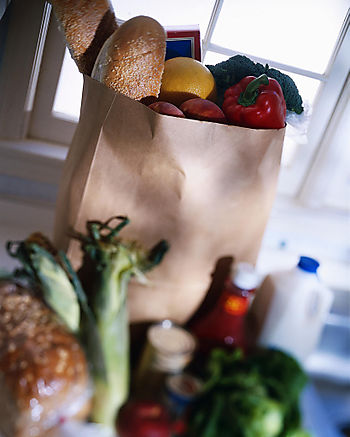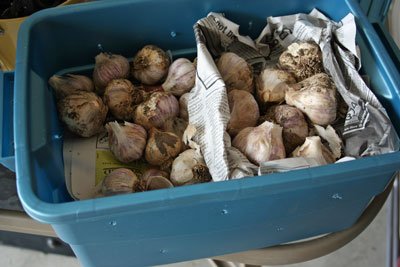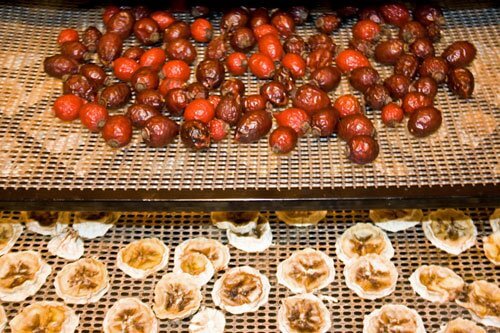Frugality with Food, Revisited- Part 2

Here is my continued list of strategies for keeping my grocery costs low (while keeping healthy foods a priority), in the midst of the rising grocery costs:
(If you missed the first post, which also explains why I'm going through all of these ideas, you can find it here.)
9) Shopping with a detailed list— I never, ever go grocery shopping without a list of some kind. Usually, I write up very specific lists, based on my meal planning, what I already have in my house (it's important to actually check and be reminded of what you do have!), what deals I need to specifically look for, and how much I have to spend. I try to split up the amount that I have based on what I think I will spend at each store, and it helps me to stay on track as I mentally calculate what my cart is up to.
10) Buy in bulk— It really is worth it to make enough room in your budget to buy in bulk (if you don't have extra room, this might mean you tighten your belt for a few weeks and try to eat really cheaply, so that you have a bit of extra to start stocking up with, and then once you get going, a cycle begins to naturally develop so that some items you will already have stocked up and some will need to be bought).
I buy my grains and dry beans in bulk, I refill my spice containers from larger bags, I buy canned tomatoes and tomato paste in flats from Costco, and I just recently purchased our first partial side of beef (which really does make it more affordable, if you can set aside a chunk of money to do it).
11) Being aware of the cost of items and of particular meals— Some of you may remember a short series I did on calculating my meal costs not so long ago. To do this, I had to break down my ingredients into their individual costs (per cup, per egg, per potato, etc.). This was an eye-opening experience!
12) Using a price comparison notebook— Now, I don't actually do this anymore (and only did it for a brief time), because I have a fairly odd, visual memory with stuff like this. I just remember exactly what I pay for food items, or the price per pound range that I consider acceptable or cheap on all of my produce items, etc. I can often tell you to the penny. I'm just weird like that, I suppose.
But if you aren't, consider keeping a little notebook in your purse or diaper bag, where you record the prices of the regular items that you buy, at the different stores where you shop, as well as when they go on good sales. Over time, you will see patterns emerging of where to buy which items, and you will start to get more of a feel for knowing what is the best price for an item.
13) Garden— I am in my second year of gardening, and have planted quite the array of food in my suburban backyard! I've planted winter and summer squash, lettuce and greens, radishes, turnips, carrots, onions, strawberries, peas, cucumbers, watermelons, corn, herbs, tomatoes and peppers. If my garden does even relatively well, I will gain far more in produce than I spent in garden expenses!
14) Preserve summer's bounty— So far, I have stocked up about 13 boxes of various sizes of canning jars, in anticipation of preserving my garden harvest (all of which came free or for a steal at garage sales)! Even if you are not gardening, I would strongly suggest taking advantage of great prices on produce in the summer and preserving as much as you can!
Tomatoes (diced, sauce, paste), frozen fruit or preserves (all berries, peaches, apples, cherries, etc.), pickles, fermented vegetables (and salsa, chutneys, sauces, etc.), frozen diced bell peppers, and anything else you can think of. Find a really good produce market or farmer's market, and buy in 10 lb, 20 lb or larger amounts. Produce is much cheaper this way, and having a canning/preserving day (or several) with a friend is actually a lot of fun!
15) Cooking from scratch— Silly me, I almost forgot about one of the most obvious things! Making homemade food is almost always cheaper than buying convenience foods, not to mention being infinitely healthier, but I won't go there right now. We'll save that for another day. 🙂
Now, as I'm thinking about this, I'm realizing that there are a few areas that I can maybe improve upon:
1) I don't routinely plan out my breakfasts or lunches. Lunch is usually leftovers from dinner, or else something very simple like sandwiches, yogurt with fruit and nuts, etc. Breakfast is whatever I feel like serving, based on what was cheap at the store, and/or plentiful in the house. Occasionally popular consensus (ie. my husband and daughter) alters what I had intended to make.
I think that I will start planning out at least my breakfasts, and will consider planning my lunches as well. This will help me to shop even more carefully, and make even better use of what we already have. It may help us to reduce hunger-driven choices of expensive items, rather than what was already planned (I know that we will still eat things just because we feel like it, and I don't think it's realistic or even desirable to stop doing that altogether- eating is supposed to be enjoyable, and sometimes it's just nice to eat what you crave).
2) Plan for one cheaper meal each week. By this I mean really cheap, like rice and beans. I have often heard of people who do this for the purpose of practicing gratefulness, and being aware that many people in the world eat like this or even much less, and how richly we are blessed to have such an abundance of food in North America. I think this would also serve the budget at the same time, and make us more aware of the wonderful food that we are eating the rest of the time. I need to run this idea past my husband, and I'm not sure exactly how I would do it, but I think the idea has potential.
3) Couponing is not a great option for me. Never has been, and I anticipate it never will be. The foods I buy are just simple, whole foods, not something that manufacturer's put out coupons for. As well, they just aren't really done much in Canada.
That said, I have thought for a while now that I could be using them at least for a few items: toilet paper, razor blades for my husband, batteries, canned fish or tomatoes (though I hope to decrease our use of these with the BPA info that's out), and… hmmm, we really don't buy much typical stuff. Anything else I could use coupons for?
What ideas has this list sparked for you? Are there things that you want to start implementing? Do you have ideas for me? (yes, please– ideas are good!)
Frugal Fridays are hosted by Biblical Womanhood






I agree about coupons. I’ve tried, but I’ve come to the conclusion that they’re primarily an advertising gimmick… just a way of getting us to buy stuff we wouldn’t ordinarily.
I’ve been reading your blog for some a while now and I agree with so much of what you say – this post really resonates with me today – perhaps because I am working on cutting costs even more and these are all things I do and affirmation is a wonderful thing sometimes.
My best tip is really simple… NEVER go shopping when you are hungry. I also find it good to have clean teeth and then you really aren’t thinking about eating, just about what you are there to buy. I went shopping hungry recently and came back with so much stuff, most of which wasn’t very healthy!
Thanks for the tips. I will be putting them into practise as my food bill has gone up a lot recently.
Coupons- I’ve been using them more often, and I think I’m doing pretty well.
Yesterday at the store I used coupons for applesauce and
pickle relish, among other things. Between the store discount card and my coupons, I saw the register go down $40.
I’ll have to think more on this and see if I can come up with more ideas. I know what you mean about coupons though. I think there must be more in the USA from what I hear. I don’t think I’ve ever found one I can use. They are normally for introducing the latest prepackaged food. If I even see any at all.
One thing we do (only would work in some places in Canada) is use a President’s choice credit card to buy groceries. Now I know this is controversial- and I wouldn’t recommend it to everyone- but we pay it off later that night and get the points. For about the last year they have also at my store (I think its just at stores that sell PC brand such as Loblaws,Valumart, Indendent, Superstore, etc, which conveniently is the ONLY thing we have here) is they do bag points also if you use your PC card or PC debit card. I get 50 points per cloth bag I use. With that and grocery points, which is per dollar spent, I get $20 in free groceries every 3-4 months. The only catch is that I didn’t know this existed until a kind cashier told me. I had been using cloth bags for years, but apparently this has just been going on about a year now. I kept using them until the cashier told me. Now I need to remind the cashiers each time for my points (they scan a card right before I pay). Check it out if you are willing to/normally pay with debit or credit cards and see if its at your store. I know its not everywhere even at those stores but most I have seen around here. Other places in the past give 3-5 cents per bag you bring. It does add up. Its worth it to me financially and also for helping take good care of the resources God has given us.
Hello fellow Keeper! You have some great points in this post and the last. I do most of these things too, although some weeks I get a bit slack! I find consistency to be my big thing. When I get too busy, I am tempted to go the “easy” way which usually means more money.
You’ve motivated me to think about these ways again. Thanks for sharing!
lv,
Joy
You’ve probably already checked out Money Saving Mom, Biblical Womanhood’s sister site, but you might want to think about giving Crystal’s coupon technique a try. It sounds like we’re about the same–I could never use coupons because we never ate much processed food. But now I can get all of our toiletries for free or nearly-free from CVS and Walgreens, so that has freed up a lot of grocery money, since the toiletries were lumped in with everything else before.
She has some good explanations for beginners, but feel free to shoot me an e-mail if I can help at all. Great series!